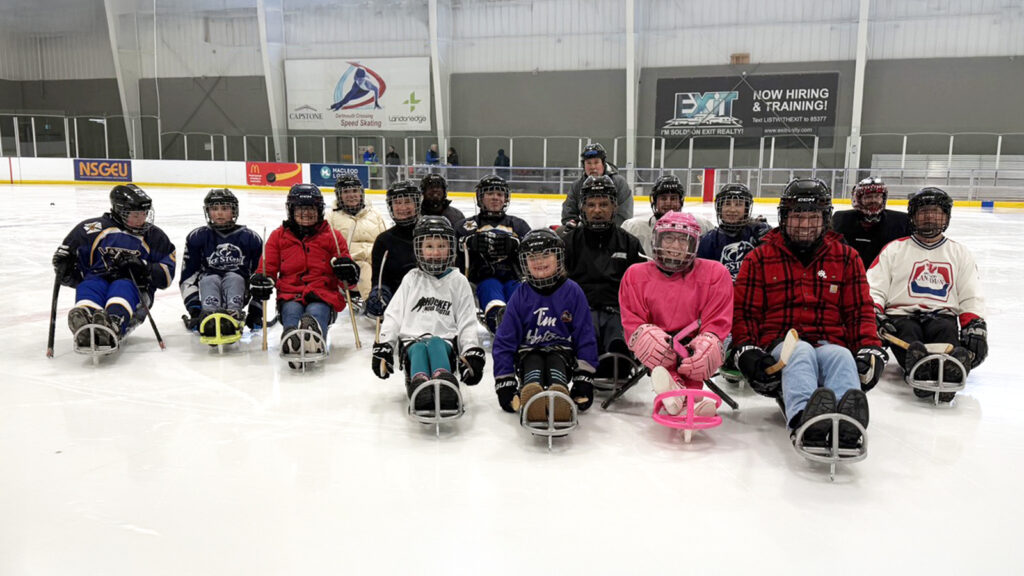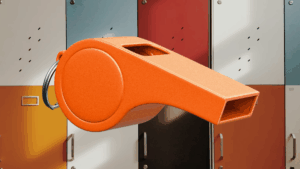
The Dartmouth Crossing Speed Skating Club is looking to develop additional winter ice sport options for athletes with disabilities.
It partnered with Hockey Nova Scotia in February to host a Try-A-Sledge event at the RBC Centre in Burnside, where Halifax Mayor Andy Fillmore and several municipal councillors and staff got a first-hand look at what sledge sports have to offer.
“We wanted the mayor and councillors to be able to talk about the experience,” said Dartmouth Crossing Speed Skating Club president Sheila McGinn.
“Most people think about sledge programs as being for wheelchair athletes, whether at the local level or the Paralympics, but there are able-bodied athletes in them as well. Yes, it’s largely to reach out to the community and make them aware of what’s available for athletes with disabilities, but we wanted the councillors to be able to say, ‘Look, I’ve tried this, it’s fun, it’s accessible.’”
In 2023, having tested the concept of bringing speed sledge onto arena ice (it was previously hosted on outdoor long track ovals, like the Emera Oval), the club ran a trial program, and followed that with regular season programming. It then approached the RBC Centre and Halifax Regional Municipality about the possibility of retrofitting one of the surfaces at the RBC Centre for sledges. This retrofit was completed following the 2023 North American Indigenous Games in Nova Scotia. It included the replacement of some hockey boards with plexiglass boards so athletes off ice in their sledges can see what is happening on the ice, artificial ice where the athletes enter and leave the ice in their sledges, secure storage for sledges and automatic door openers into the arena and the dressing rooms.
The event in February was a way of saying thanks and to show the difference the retrofit has made.
“They had a blast,” said McGinn. “There were a couple of them out there racing against each other. A couple of them might’ve found it a little harder than others did, but just in the half-hour to 45 minutes they were out there, they were all able to use the sledges and get around with them.
“Hockey Nova Scotia did a demo of sledge hockey. One of the sledge athletes who came was a goalie, so he put on his equipment and we set all that up and people could figure out how to shoot while pushing the sledge. We also did a demo of what we do with sledge racing, or as we call it, speed sledge. They were having fun with it and understood what we were getting at, that we wanted them to know just how much fun this is for anyone who might like to get involved.”
Advanced sledge athletes usually have their own sledges, but McGinn said the club is building an inventory of sledges and related equipment at the RBC Centre so that newcomers to the sport can give it a try without having to cover the expense of a sledge. Sport Nova Scotia’s Parasport Loan Program includes sledges and can be accessed by organizations developing sledge programs to assist with the growth and development of the sport.
McGinn said there have been as many as 15 parasport athletes involved in speed sledge racing within the program and they continue to work with Hockey Nova Scotia on introducing participants to sledges and learning to use them.
“Sledge racing actually predates sledge hockey in the Paralympics,” said McGinn. “But it was all long track and none of it was indoors. Now we have the ability to do that and the focus now is how do we build upon that, and our partnership with Hockey Nova Scotia is part of that.”
Anyone wanting to try a sledge can contact McGinn at sm23@eastlink.ca or 902-443-8781; Dean Smith, chair of Hockey Nova Scotia Diversity and Inclusion at dsmith@hockeynovascotia.ca or 902-229-1333; or Conor Bint, president of Speed Skating Nova Scotia, at conorbint@gmail.com.




